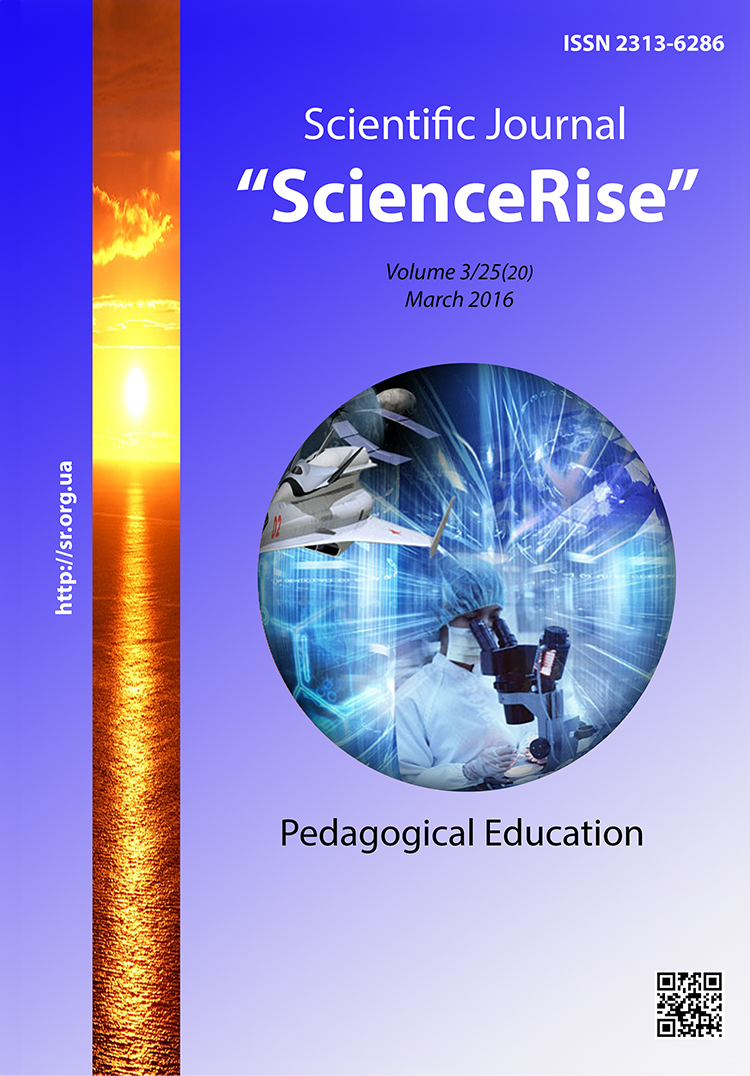The influence of modern learning theories on transformation of methodological science at higher pedagogical school of Ukraine
DOI:
https://doi.org/10.15587/2313-8416.2016.63980Keywords:
methodological science, competence, transformation, professional preparation of future primary school teachersAbstract
In the article the different strategies of teaching of students are analysed in the countries of the globalised world (the USA, Canada, Great Britain), among which are named: constructivism (D. Djonassen, R. Ronning, G. Shrow and others), theory of transformation (R. Boyd, M. Clark, J. Mezirov and others), humanistic and cognitive theory of learning (A. Maslow, J. Miller and others), which are variously explained by a teaching process. It is specified that at the level of private theories and teaching models they complement each other quite often.
It is described that at determination of strategies of teaching in the countries of the globalised world, priority is given to: development of motivation to teaching; self-education, self-realisation and self-actualisation of personality; organisation of the process of teaching that eliminates competition; teaching to work in a team; forming of willingness to live and work in difficult and constantly changing world.
Based on modern theories of teaching mentioned above, basic changes in methodological science are named at the higher pedagogical school in the preparation of future primary school teachers, which at the focus of attention put competence approach, educational results and methods of their measuring; functions, roles of teacher and students; update of maintenance of leading methodological principles, forms, technologies; variability, interdisciplinarity, antropologisation, informatisation, globalisation
References
Kremen, V. G. (Ed.) (2008). Encyclopedia of education. Кyiv: Urinkom Inter, 1040.
Danilov, A. N. (1998). Transitional society: problems of system transformation. Minsk: Harvest, 429.
Mezirow, J. (1997). Transformative Learning: Theory to Practice. New Directions for Adult and Continuing Education, 1997 (74), 5–12. doi: 10.1002/ace.7401
Jonassen, D., Peck, Н., Kyle, L., Wilson, B. (1999). Learning with Technology. A constructivistic perspective. NJ: Prentice Hall Inc., 234.
Zimmerman, B. J. (2008). Investigating Self-Regulation and Motivation: Historical Background, Methodological Developments, and Future Prospects. American Educational Research Journal, 45 (1), 166–183. doi: 10.3102/0002831207312909
Boyd, R. D., Myers, J. G. (1988). Transformative education. International Journal of Lifelong Education, 7 (4), 261–284. doi: 10.1080/0260137880070403
Cranton, P. (1994). Understanding and Promoting Tranformative Learning: A Guide for Educators of Adult. San Francisco: Jossey-Bass.
Tagunova, I. A. (2015). Issues of modern learning theories in the USA. Pedagogy, 6, 115–124.
Zeer, A. F., Pavlova, A. M., Symanuk, A. A. (2001). Modernisation of trade education: competence approach. Мoscow, 216.
Makarova, N. S. (2012). Transformation of didactics of higher school. Мoscow: Flinta, 180.
Kagan, S., Kagan, M.; Sharan, S. (Ed.) (1994). The Structural Approach: Six Keys to Cooperative Learning. Handbook of Cooperative Learning Methods. Westport: Greenwood Press.
Downloads
Published
Issue
Section
License
Copyright (c) 2016 Людмила Викторовна Коваль

This work is licensed under a Creative Commons Attribution 4.0 International License.
Our journal abides by the Creative Commons CC BY copyright rights and permissions for open access journals.
Authors, who are published in this journal, agree to the following conditions:
1. The authors reserve the right to authorship of the work and pass the first publication right of this work to the journal under the terms of a Creative Commons CC BY, which allows others to freely distribute the published research with the obligatory reference to the authors of the original work and the first publication of the work in this journal.
2. The authors have the right to conclude separate supplement agreements that relate to non-exclusive work distribution in the form in which it has been published by the journal (for example, to upload the work to the online storage of the journal or publish it as part of a monograph), provided that the reference to the first publication of the work in this journal is included.

